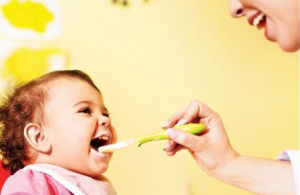When to Introduce Solids
Babies are often ready to ger their first solid food between 4 and 6 months. At this point, they lose the extrusion reflex that is beneficial for sucking a breast or bottle but can shove a spoonful of baby cereal right back out. However, check with your baby’s doctor beforehand.
How to Know When Your Baby Is Ready
Here are some signs that your child is ready to try solids:
- She can sit up (with support) and can hold her head and neck up well.
- Her birth weight has doubled.
- She’s interested in what you’re eating and may even try to grab food from your plate.
- She can keep food in her mouth rather than letting it dribble out.
- She shows signs of being hungry for more than she’s getting by clamoring for more when her bottle is empty or wanting to nurse more often.
What Foods to Start With
A common first baby food is a single-grain, iron-fortified cereal such as rice cereal or oatmeal. These baby cereals have the advantage of boosting your baby’s iron intake, and they’re easy to digest. Just mix with a little baby formula, breast milk, or even water on occasion. In addition to baby cereal, you can start your baby out with pureed fruits and vegetables.
Baby Feeding Gear
The feeding aisle at your local baby store is crammed with gear, but you don’t need that much to feed a baby. The essential things are a soft-tipped spoon, a bib, a nonbreakable dish, and a highchair.
How to start
For the first time introduce the solid food to your baby, make it simple. Try baby cereal mixed with formula or breast milk. Or begin with purees like pear, sweet potato, or peas. Don’t be surprised if your baby doesn’t seem crazy about solids right away. Keep on trying and your baby will catch on.
Preventing Choking
Whether your baby is eating purees or food with more texture, it’s always necessary to watch carefully and take precautions to prevent choking. Babies should always be fed sitting upright in a high chair, not reclining in a swing or car seat. Avoid feeding your baby foods that are clear choking hazards, such as whole grapes, hot dogs, or popcorn. Foods such as carrots, while great in cooked and mashed or pureed form, should only be offered to babies as finger food when cut into very small chunks.
Feeding baby solids doesn’t need to be a challenge. There are just a few simple rules and milestones to keep in mind to make sure your baby’s food is just right to grow on.

